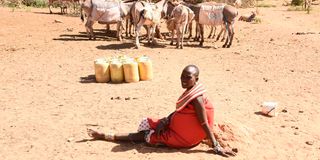WFP commits Sh7 billion to mitigate drought in Kenya

A woman takes a rest on arriving at the only water point serving over 10 kilometers square at Longesire borehole in Samburu East on February 1, 2022. While water and food scarcity worsens as the drought continues to bite, women and girls bear its brunt.
The World Food Programme (WFP) on Wednesday announced that it has committed Sh7 billion shillings ($54 million) as relief assistance to help some 940,300 people facing severe drought in ten counties in Kenya.
Lauren Landis, WFP country director for Kenya, said the food and cash will be distributed under the Lisha Jamii Phase II program between April and September 2023.
“The second phase is Sh7 billion and we hope to make it Sh10 billion. This is substantial, but we still need more,” she said when she met Deputy President Rigathi Gachagua.
Landis said the ongoing nutrition program for children and lactating mothers will continue.
During the meeting, the WFP representative announced the arrival of 25 metric tons of wheat and 16 metric tons of sorghum at the Mombasa Port due next week.
Gachagua said the government is working with other partners to save lives and livelihoods.
“We have missed five consecutive rain seasons. This is the longest drought in 40 years. We have over 5.3 million Kenyans facing starvation; we have lost 2.5 million herds of livestock; thousands of children are malnourished; it is that bad,” Gachagua said.
In WFP Phase I, at least 89,000 households benefited from relief support.
The Second Phase brings in 157,500 households. Beneficiaries are identified through the National Government Administrative Authorities and County Governments.
Under Phase II, food assortments and cash will be distributed to families in the identified counties.
Each household will receive Sh11,200 cash in Isiolo, Kitui, Baringo and Tana River counties per month. An assortment of food of 64kg per household will be distributed in Turkana Samburu and Marsabit per month. On the other hand, residents of Wajir, Garissa and Mandela affected by the famine will receive Sh5,600 and 34.5 kg food per month.
Ms Landis said the ongoing nutrition programme for children and lactating mothers will continue.
The Deputy President more partnerships in water supply, livestock feeding, nutrition rations for children as well as expectant and lactating mothers, and dialogue and peace-building in conflict areas.
He pointed out that food provision, including for schools, will not only save lives but also help children to learn instead of picking guns and engaging in rustling.
A return of the WFP school feeding program, which ended in 2017, was discussed as the country works on long-term solutions to food security by mitigating the impact of climate change.





